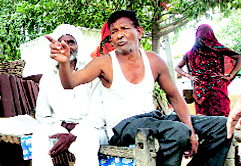Lucknow, Aug 30: For 10 years, 29-year-old Ram Pal was a practicing Christian, but three days ago he converted and become a Hindu. The change in faith, however, has not tangibly altered his life as the struggle to make ends meet and the worry about the future of his children continue unabated.
 Despite converting to Christianity in 2001, seven Valmiki families in Asroi village were not accorded minority status. Instead, the village register – maintained by the district administration – continued to identify them as Scheduled Caste. This continued for over a decade, but Ram Pal said that over the past few years, this ambiguous identity of being neither a Christian nor a Dalit was becoming increasingly difficult.
Despite converting to Christianity in 2001, seven Valmiki families in Asroi village were not accorded minority status. Instead, the village register – maintained by the district administration – continued to identify them as Scheduled Caste. This continued for over a decade, but Ram Pal said that over the past few years, this ambiguous identity of being neither a Christian nor a Dalit was becoming increasingly difficult.
Ram Pal, who like others in his community raises pigs, said, “We still used our SC identity to get our children admission in schools and avail to various government schemes. We celebrated Holi and Diwali along with Christimas. But people were asking questions. If you’re a Christian, how can you be a Dalit?”
Another such Dalit, 44-year-old Ram Chandra, said, “Our children go to school, on the basis of their SC certificates. But most drop out in their teens and look for work in Hathras and Aligarh. Now that we’re Hindu, at least no can doubt that we’re Dalits.”
On Wednesday, a church belonging to the 7th Day Adventists that functioned from a small room in the village was “converted” into a temple through a “shuddhikaran” (purification) ceremony that saw the “ghar wapsi” (reconversion) of 72 Dalit Valmikis in the seven families by various Hindu groups, including the RSS, VHP, Bajrang Dal and Arya Samaj, said villagers.
Ram Pal said that the Dalit community did not want the puja to take place within the church. “But, they said it was the only way for us to become Hindus again,” he said.
Meanwhile, Khem Chandra, the Sangh pracharak and pramukh of Dharam Jagaran Vivad in Aligarh asserted that the conversion was a “conscious choice made by the Dalit Valimiki community”. However, the news of the appropriation of the church spread tension in the area.
Fearing an outbreak of violence, the district administration locked the room on Thursday. The Shiva poster, which was put up in the place where a framed-photograph of Jesus Christ used to hang, has been taken off “and kept in a safe place”.
The belongings of the church – a cupboard, Christmas-lights and a single copy of the Bible – has also been kept in a locker.
The Christian community has alleged that such conversions were a part of an RSS conspiracy, aimed at reaping electoral benefit. Seeking immediate action against the perpetrators, civil rights activist John Dayal said, “It is the right of an individual to convert to any religion of his choice. But such mass conversions imply political, social and physical coercion and the threat of violence. I condemn the coercion and conspiracy of the Sangh Parivar which is using it polarise the religious environment in the state with an eye on the elections.”
Father Dominic Emmanuel, community leader and the editor of a Christian magazine in Delhi said, “With the BJP in power, these groups have become assertive.”
The village pradhan also pointed out that the BJP, for the first time, had received an overwhelming majority of the votes in the village. “Usually, the votes go for RLD. This time the elections was about Hindus and Muslims and every one voted for Modi. That has been reflected here,” said Vikas Choudhury, pradhan of Asroi.
But, while the RSS and the VHP have been making in-roads into the village by working with the Dalit-Christian community, villagers said that it was not simply a matter of faith, but also economics.
“Over the years, the activities of the Church here have receded. We were promised schools, health care and better lives, but nothing came of it. We haven’t been accorded minority status and soon, we feared, our Dalit status would also be taken away from us,” said 54-year-old Guji Lal, who added that Hindu groups in the past months had been increasingly active in the village, convincing people to ‘reconvert’ to Hinduism.
Asroi village, with its pucca roads and expansive houses, has become obviously prosperous. But the cluster of 10 cramped single-storey structures – away from the rest of the village – belonging to Dalit Valmikis has not been touched by this prosperity. While the backbone of the village economy is farming of cash-intensive crops, the Dalit families almost exclusively rear pigs, selling meat only to other Dalits from nearby villages.





Comments
Add new comment